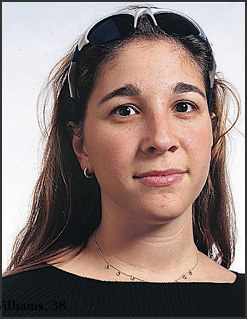 |
|
|
 |
 |
 |
 |
The journey to adulthood begins in the roaring 20s: growing up, getting married, starting a family. The future looms: time to get over that fear of the dentist, remember to use sunscreen and practice safe sex.
|
 |
|
|
|
 |
 |
 |
 |
Appearance: Effects of aging are seen in the skin as early as the 20s, when fibers that keep skin taut begin to weaken.
Weight: A healthy weight in youth pays off in later years.
A black man with a healthy weight from his early 20s will live an estimated two decades longer than one who is 100 pounds overweight. After 25, the average American gains between 0.4 and 1.8 pounds per year through middle age.
Fertility: Washington women in their late 20s have more babies than women of any other age. Biologically, fertility for women begins to gradually decline after 27.
Vision: Half the people in their 20s in Washington wear contacts or glasses. By the time they reach their 70s, 95 percent do.
|
 |
|
 |
 |
 |
Getting hitched: Across Washington, people are most likely to get married between ages 20 and 24. In King County, both men and women marry later, most often from 25 to 29.
Birth control: Women in their 20s are more likely than any other age group to rely on the birth-control pill and male condoms for contraception.
A childhood phobia continued? Around Puget Sound, just over 54 percent of people in their 20s have seen a dentist in the past year, compared with nearly 70 percent of people in their 50s, the group with the highest rate of dental visits.
|
 |
|
 |
 |
 |
Delayed adulthood: Most Americans believe someone isn't truly an adult until his or her mid-20s - a recent survey showed the "official" age for becoming a grown-up is 26.
|
 |
|
 |
 |
 |
Well out of high school and at least partially on their own, most 20-somethings are ardent explorers. They're defining their identities, seeking knowledge, checking out life. And, for many, taking serious risks.
In Washington state, 18- to 24-year-olds are most likely to smoke and least likely to wear seat belts or have health insurance. Binge drinking reaches its peak at age 21.
Tragically, about 70 percent of deaths in the early 20s are from accidents, suicides or homicides. Between ages 18 and 34, some 2 to 5 percent have a medium to high risk of acquiring HIV. About 70 percent of all sexually transmitted diseases are diagnosed in women younger than 25, though more women than men are screened for STDs.
Risk-taking can be managed:
· Weigh the anticipated good time or need to take a risk against the possible consequences.
· Does your behavior fit with your basic values and goals?
· Despite your confidence, are you aware that alcohol or other substances cloud your judgment on just about everything?
· Will you enjoy the evening just as much if you have, say, three drinks instead of six?
- Warren King, Seattle Times staff
|
 |
|
|
 |
 |
'I am young enough that I can just
enjoy myself.' |
 |
 |
 |
Photographed on Oct. 1, 2003 by Harley Soltes,
Seattle Times staff |
Melissa Glaser, 25
|
Residence: Seattle
Occupation: software engineer
Personal: single
Glaser is an observant Jew of Hungarian, Russian and Polish extraction. She is engaged to be married and plans to quit working in her early 30s to raise "a house full of youngsters." Though in otherwise good shape, she was diagnosed with high blood pressure when she was 21. She takes beta blockers every day and will have to take them for the rest of her life.
Uncommon illness: Glaser is a young woman with an older person's disease. She has a cardiologist and daily prescription pills. Exercise and diet failed to lower her blood pressure. Glaser worries about the long-term effects of taking beta blockers. An athlete who has suffered broken bones playing basketball and gymnastics, Glaser struggles to accept that she has a chronic illness: "I'd much rather have a broken bone than this because they heal. They get better."
Myths about 20-somethings: Glaser's life isn't about partying and clubbing - she doesn't have the time. In addition to her full-time job at the Redmond division of Honeywell, the engineering giant, she is studying for her master's degree in software engineering from Seattle University. Squeezing in time for family and friends can be a challenge. Glaser says life definitely gets more hectic after college: "There are times when sleep is a commodity that gets away from you."
Body image: Glaser is 5 feet 8 inches tall and weighs 160 pounds. She considers herself fit and says, "I'm tall and have too much muscle to be model thin." When she was younger and growing up in New York, Glaser used to fret about her outfits and leaving the house without makeup. She has opted for the natural look since relocating to Seattle. "I am me, and how others perceive me does not really matter, other than those close to me."
Role model: Glaser admires women who are nurturers and helpers. She bemoans the competitiveness and one-upmanship she sees in some females. Glaser hopes to be like her Polish maternal grandmother, who was her family's sole survivor of the Holocaust. At 75, her grandmother still goes out every weekend with her girlfriends in New York. "I hope that I will still have the energy and stamina to be able to live life as fully as she does when I reach her age."
- Kyung M. Song, Seattle Times staff
|
|
 |
|
|
|
 |
 |
|
|
 |
 |
 |
 |
 |
 |
|